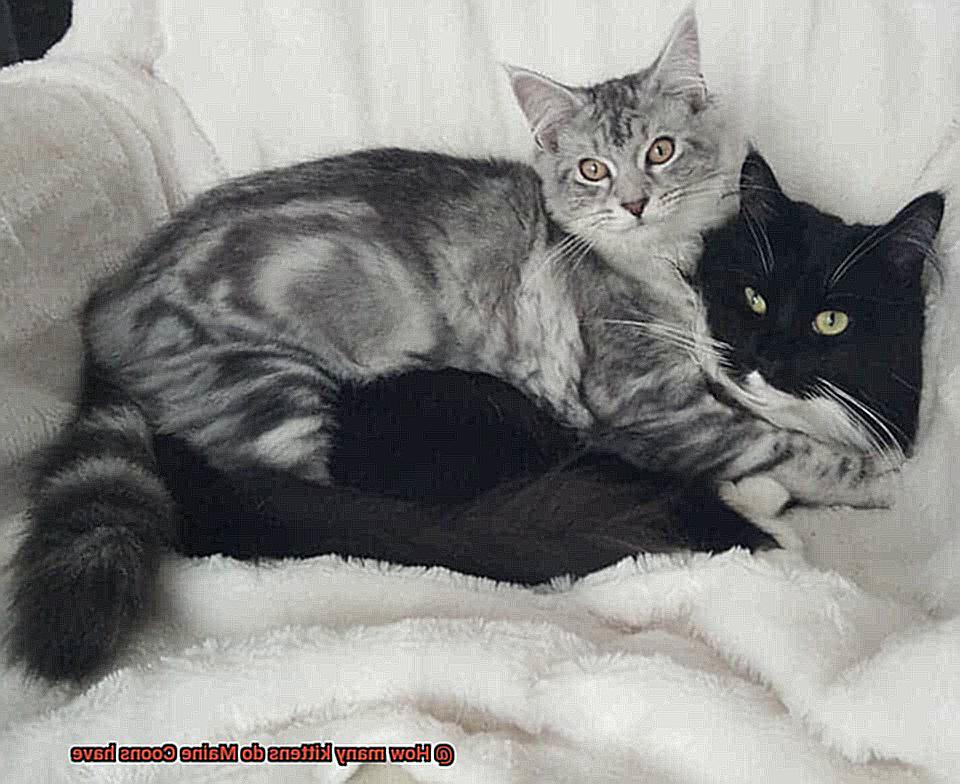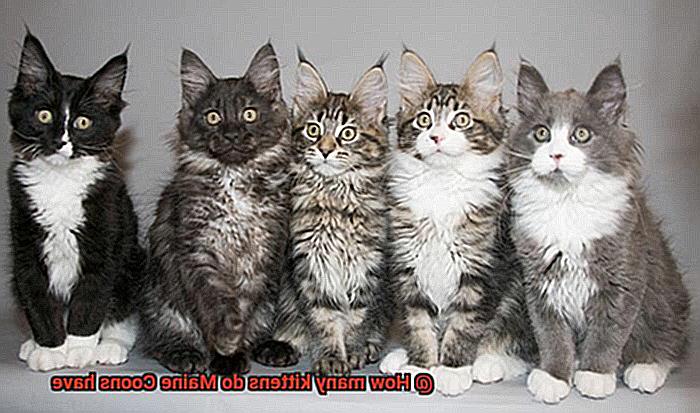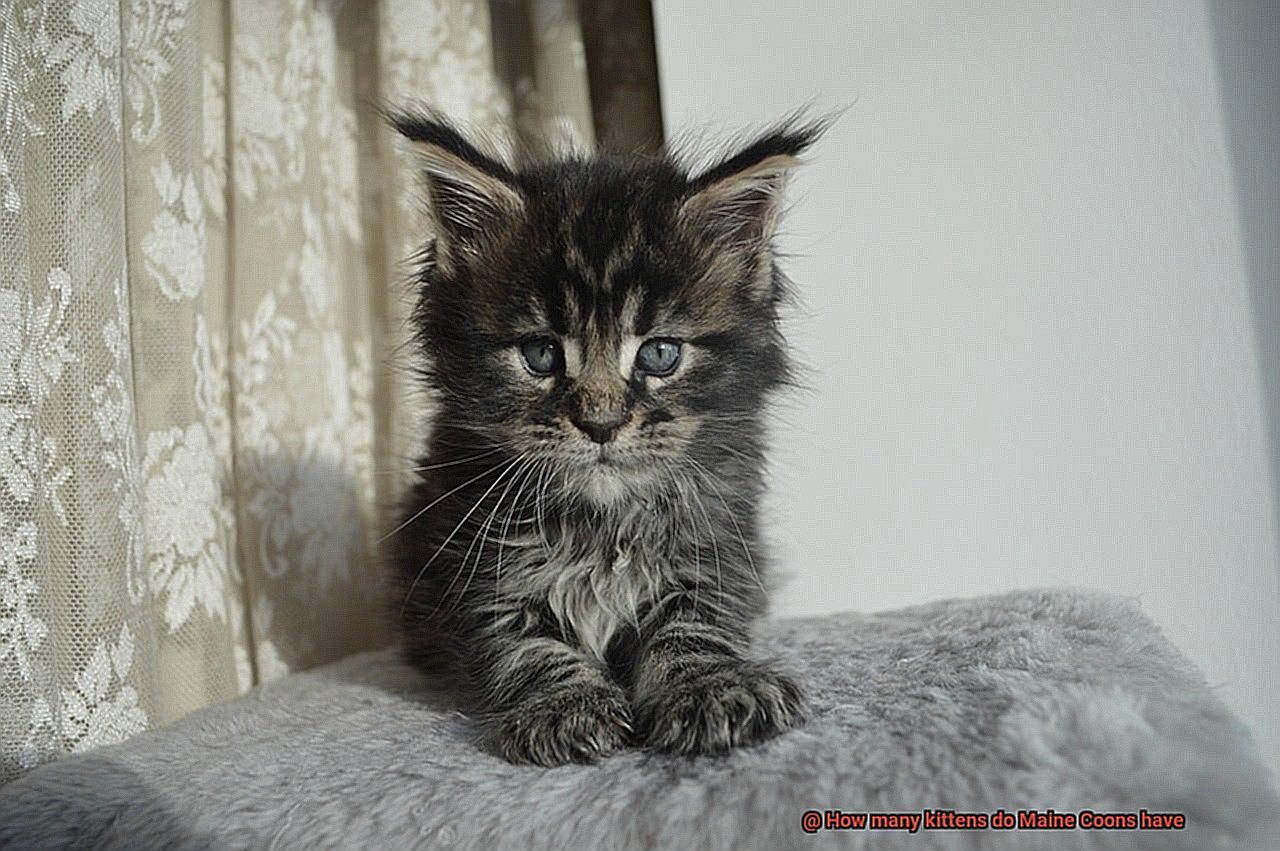Are you a cat lover on the hunt for a new furry friend to join your family? If so, you may have already considered adding a Maine Coon to your household. These beautiful felines are renowned for their gentle nature and loving personalities. But, have you ever wondered how many adorable kittens these majestic creatures can produce?
Maine Coons are known for their impressive size, and this extends to their litters as well. On average, a Maine Coon litter can consist of four to six kittens. However, it’s not uncommon for these cats to have even larger litters with up to eight or nine kittens – that’s a whole lot of cuteness.
But why do Maine Coons tend to have such large litters? One reason is their history as working cats on farms in Maine. Being able to produce a larger number of kittens ensured that there would be enough cats available to assist with rodent control.
In addition to their farming background, Maine Coons also have a genetic predisposition for bearing larger litters. This trait, combined with their nurturing and devoted mothering instincts, makes them an ideal breed for producing bundles of furry joy.
So if you’re looking to add multiple new feline companions to your household, a Maine Coon might just be the perfect choice for you. With their gentle nature and ability to produce big litters of adorable kittens, they’ll bring plenty of love and joy into your home.
Litter Size: How Many Kittens Do Maine Coons Have?
Maine Coon cats are an extraordinary breed known for their friendly nature and excellent hunting skills. But, if you’re considering breeding your Maine Coon, it’s natural to wonder how many kittens to expect in a litter. On average, Maine Coon cats tend to have larger litters than most other breeds, with four to six kittens being the norm. However, litter size can vary depending on several factors.
Age, health, and genetic makeup of the mother cat are significant factors affecting litter size. Generally speaking, older cats tend to have larger litters than younger ones. Additionally, female Maine Coons with a history of producing bigger litters are more likely to continue doing so in future pregnancies. Furthermore, environmental factors such as stress or poor nutrition can also impact litter size.

If you’re looking to increase your chances of having a larger litter, breeding your female Maine Coon with a history of producing large litters is recommended. Moreover, providing her with a healthy diet and stress-free environment during the gestation period can positively impact litter size.
While larger litters may seem like a benefit, they can also pose challenges for both the mother cat and the owner. Larger litters require more attention and care from the owner, which can be demanding. The mother cat may also experience more stress and exhaustion as a result.
In summary, while Maine Coons tend to have larger litters than most other breeds, there is no set number of kittens that can be expected in every litter. It’s essential to prioritize the health and well-being of your feline friend above all else. Regular veterinary check-ups and spaying or neutering if necessary are vital for their long-term health.
Factors Affecting Litter Size
Genetics
Firstly, let’s talk about genetics. The size of a litter is often hereditary, meaning that if the kitten’s parents have had larger litters, their offspring are also more likely to have larger litters. However, keep in mind that each cat is unique and there are always exceptions to the rule.
Age
Age is another factor to consider. Younger cats tend to have smaller litters compared to mature cats over three years old. So if you’re hoping for a large litter, it may be worth waiting until your Maine Coon is a little older.

Size
The health of your cat is crucial in determining litter size. If your cat is unhealthy or has underlying health issues, it can lead to smaller litter sizes. To ensure your cat has the best chance of producing healthy kittens, make sure they receive regular checkups from a veterinarian and follow a proper diet.
Nutrition
Lastly, nutrition plays a vital role in reproductive health. A well-nourished cat with a balanced diet is more likely to have larger litters than cats with poor nutrition. So make sure to provide your feline friend with high-quality food that meets their nutritional needs.
Quality of Kittens and Breeding Considerations
If you’re passionate about breeding Maine Coon cats, it’s crucial to consider the quality of the kittens you’ll be producing. As an expert in the field, I can assure you that careful planning and consideration are essential to producing high-quality kittens that meet certain standards.
To produce healthy and beautiful Maine Coon kittens, breeders must choose cats with good temperaments, strong bone structure, and beautiful coats. It’s also important to consider the health history of the cats being bred to reduce the risk of genetic health problems in the kittens.
Breeding Maine Coons is a complex process that requires knowledge, time, and effort. Breeders must be prepared for potential risks and complications during pregnancy and birth. They should have a detailed plan in place for caring for the pregnant cat and her kittens to ensure their health and well-being.
It’s worth noting that breeding Maine Coons should only be done by experienced and responsible breeders. This guarantees that the kittens are healthy and well-cared for throughout their lives. If you’re interested in breeding Maine Coons, it’s essential to do thorough research and seek guidance from reputable breeders and veterinarians.
Providing a Safe and Comfortable Environment
Maine Coon cats are a truly remarkable breed, known for their immense size, friendly personalities, and exceptional hunting skills. However, as a pet owner, you may be curious about the litter size of these majestic felines. While it varies from one cat to another, Maine Coons typically have larger litters than other cat breeds.

On average, a Maine Coon can have between 4-6 kittens in a single litter. However, it’s not uncommon for some mothers to give birth to up to 12 kittens. It’s worth noting that the mother cat’s age, health condition, and quality of care during pregnancy and after birth can all impact the number of kittens she can have.
As a responsible pet owner, it’s vital to provide a safe and comfortable environment for your pregnant Maine Coon cat and her litter. During pregnancy, your cat requires a nutritious diet rich in protein and other essential nutrients to support her kittens’ growth while keeping her healthy. You should also offer her a cozy bed where she can rest and relax.
After giving birth, your kittens need warmth and comfort without exposure to hazards like cold drafts or loud noises. Furthermore, ensure that the mother cat has ample food and water to produce enough milk for her young while nursing them peacefully.
Regular visits to the veterinarian during pregnancy and after birth are essential to keep both the mother cat and her kittens healthy. Your vet will offer guidance on nutrition, exercise, and any medical concerns that may arise.
Adequate Nutrition for Mother and Kittens
Providing a nourishing, balanced diet is absolutely critical during pregnancy for Maine Coons, as they require high-quality food with a balanced blend of protein, fat, and carbohydrates to ensure proper fetal development. It’s essential to feed your pregnant Maine Coon with food specifically formulated for pregnant or nursing cats since it contains higher levels of nutrients required for growth and development.
Once the kittens are born, their mother’s nutritional needs shift from her own growth to producing milk to feed her litter. To ensure that she has enough energy and nutrients to produce sufficient milk for her growing kittens, it’s recommended that you provide her with a high-quality kitten food. By doing so, you enable the mother cat to produce the best quality milk for her litter.
It’s crucial to monitor the kittens’ weight gain regularly to ensure that they are getting enough milk. Kittens should nurse every two to three hours and consume approximately 15-20% of their body weight in milk each day. Regular monitoring will help you catch any issues early on so that you can address them promptly.
When they’re about four weeks old, kittens can start transitioning to solid food. Initially, it is best to offer them a high-quality kitten food mixed with warm water to make it easier for them to eat. As they get older, kittens can gradually transition to dry kitten food.
26kj1aWt5b8″ >
Regular Veterinary Check-Ups
This includes making sure that your feline friend stays in tip-top shape. And how do you achieve this? By scheduling regular veterinary check-ups.
Annual check-ups are crucial for your Maine Coon’s overall health and well-being. In some cases, more frequent visits may be necessary, especially if your cat has specific health concerns or is at a higher risk for certain diseases.
During a veterinary check-up, your vet will perform a thorough physical examination of your Maine Coon. This includes checking for any signs of illness or injury, such as changes in weight or abnormal breathing. They may also recommend diagnostic tests, such as bloodwork or urinalysis, to detect underlying issues that may not be visible during the exam.
In addition to identifying and treating any health problems, regular veterinary check-ups also provide an opportunity for preventative care. Your vet can advise you on nutrition, exercise, and other lifestyle factors that can help keep your Maine Coon healthy and happy.

It’s important to note that Maine Coons are prone to certain health issues, such as hip dysplasia and heart disease. By catching these issues early during regular check-ups and treating them promptly, you can help ensure that your cat lives a long and healthy life.
Breeding should only be done responsibly and with the guidance of a veterinarian or professional breeder. On average, Maine Coons typically have litters of 4-6 kittens. However, the number of kittens can vary depending on the individual cat and the size of their litter.
Also Read: Twin Maine Coon Cats: Everything You Need to Know
Conclusion
Maine Coon cats are a breed that has captured the hearts of many cat lovers. Their friendly and sociable nature, coupled with their impressive size, makes them stand out from other feline breeds. One unique characteristic of Maine Coons is their tendency to have larger litters than most cats, with an average of four to six kittens per litter.
This can be attributed to their history as working cats on farms, where having more kittens meant there were enough cats for rodent control. However, the number of kittens in a litter can be influenced by various factors such as genetics, age, health, and nutrition.
If you’re considering breeding Maine Coons, it’s crucial to do so responsibly and under the guidance of a veterinarian or professional breeder. Providing a safe and comfortable environment for pregnant Maine Coons and their litters is essential for their overall well-being.
During pregnancy and nursing periods, adequate nutrition is also vital to ensure proper fetal development and milk production. Regular veterinary check-ups are necessary to maintain the health of Maine Coons who are prone to certain health issues such as hip dysplasia and heart disease.
By catching these issues early during check-ups and treating them promptly, owners can help ensure that their beloved feline friends live long and healthy lives. In conclusion, Maine Coon cats are truly exceptional creatures known for their gentle nature, impressive size, and ability to produce larger litters.







